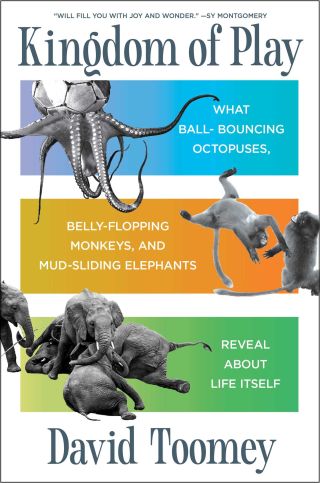Animal Behavior
Animal Play Is Fun, Fair, Chaotic, and Serious Business
David Toomey's "Kingdom of Play" is a comprehensive and well-written review.
Posted March 18, 2024 Reviewed by Michelle Quirk
Key points
- As an "outsider" to the study of play in nonhuman animals, he covers the field in an easy-to-read manner.
- It’s clear that nature takes play quite seriously—if we are to understand nature, we should, too.
- Science shows that "having fun" is a topic that must be given serious attention.

I've studied various aspects of play behavior in a wide variety of nonhuman animals (animals) for decades, focusing mostly on members of the "dog family" (canids), while some of my students have studied animals in different taxonomic groups. I humbly would say I know a lot about play behavior, but as I read University of Massachusetts's Dr. David Toomey's highly acclaimed new book Kingdom of Play: What Ball-Bouncing Octopuses, Belly-Flopping Monkeys, and Mud-Sliding Elephants Reveal About Life Itself, I immediately realized that I was in for a treat. While he covered a mass of material with which I was familiar, I hadn't put it together in the very creative and often humorous ways in which he assembled and reconstructed the data (and numerous stories) while remaining well within the boundaries of what we know and don't know.
While a good deal of nonhuman animal play is fun, chaotic, and fair, it's also serious business across many different species including humans. Dr. Peter Gray has noted that fairness makes play possible, and human children learn fairness in play. During play, nonhumans and humans alike work to understand and follow the agreed-upon rules and to communicate their intentions to play fairly. They fine-tune their behavior on the run, carefully monitoring the behavior of their play partners and paying close attention to infractions of the Golden Rules of play.
It's surely not the first time a so-called "outsider" has made me reevaluate the science underlying research on various topics in animal behavior. (One marker other colleagues and I use to judge if someone who "trespasses" into our arenas of research "gets it right" is to see how they cover our research, and David gets an A+ for how he reviews my and other major players' science.1,2) I'm very pleased that he could take the time to answer a few questions about his views of animal play, ranging from neuroscientific to evolutionary explanations, in a must-read book about play and many other closely related areas of biology and psychology.
Marc Bekoff: Why did you write Kingdom of Play?
David Toomey: I happened across an article that mentioned in passing that ethologists have agreed on no overarching theory explaining the adaptive advantage of play. Like many people, I had assumed that all play served as training for adult behavior or socialization. The answer was more complicated and far more interesting. I thought it deserved a book.
MB: How does this book relate to your background and general areas of interest?
DT: My interests range rather widely, but I am attracted to unanswered questions.
MB: Who do you hope to reach in your interesting and important book?
DT: Generally, anyone curious about nonhuman animals and their behavior. Beyond that, it’s pleasant to imagine the book falling into the hands of a young person and sparking in them a new interest, even a career as a scientist.
MB: What are some of the major topics you consider?

DT: The book begins with the centuries-long history of the study of animal play and the challenges of identifying it and distinguishing it from behavior it might resemble, like exploration and mating. It discusses the many hypotheses that try to explain its adaptive advantages, including long-standing ideas: one, that it’s practice for adult behaviors necessary to survival and, two, that it provides social animals like wolves a means to learn to cooperate.
It also discusses the more recent idea that it’s training for the unexpected, the hypothesis that natural selection has evolved in many animals a desire to “self-handicap”—to put themselves in disadvantageous positions so that they may learn to recover from those positions. For instance, running piglets at play are known to stop running and at no particular time and for no obvious reason perform flop-overs; if two dogs are play fighting, sooner or later one is likely to roll over on its back and allow the other to pounce. It also explores the neuroscience of play, describing studies of rat play, several of which discovered that when a rat play fights, certain neural networks are reinforced and strengthened, and its play-fighting abilities are ratcheted up.
The book also explores the fascinating relationship of play to dreaming. It devotes a chapter to the evolution of play, and the idea that play not only enables advantages in natural selection and serves as a potential generator of animal evolution but that the innovation it spurs may allow animals to influence our own evolution.
Readers of Psychology Today may be interested in the book for several reasons. One reason is that play of nonhuman animals is fundamentally the same as our own. Thus, in learning about their play, we learn about ourselves. A second reason, perhaps less anthropocentric, is that it allows insight into the experience of those nonhuman animals, the creatures with whom we share this earth. A third is simply that it’s fascinating. Had I not written this book, I may never have learned of dive-bombing crows, mud-sliding elephants, and drop-catching herring gulls.
MB: How does your book differ from others that are concerned with some of the same general topics?
DT: There are many wonderful books on animal emotions, animal minds, and many on specific animals—dogs, for instance. There are also books that relate nonhuman animal behavior to nonhuman animal culture. (Your and Jessica Pierce's Wild Justice comes to mind!). My book is specific to one behavior—play—but describes a range of animals that practice it. Although there have been several books on nonhuman animal play written for academic audiences, this is to my knowledge the only one written for general audiences.
MB: Are you hopeful that as people learn more about play they will realize that play is serious business for nonhumans and us and will themselves take it more seriously?
DT: Yes. In many ways, play is an essential behavior with important roles in survival and reproduction. If play did not have real adaptive advantages—that is, if it were not important—it would not appear in so many animals. And it’s been identified not only in mammals and birds, but also in reptiles, fish, and even insects (specifically, bees). Evolutionary biologists suspect that play has a history stretching back hundreds of millions of years. That means it’s endured the formation and reformation of continents, three ice ages, and two mass extinctions. It’s clear that nature takes play quite seriously. If we are to understand nature, we should, too.
References
In conversation with Dr. David Toomey, professor of English at the University of Massachusetts Amherst, where he teaches courses in writing and the history of science. He is the author of several books of nonfiction, including Weird Life and The New Time Travelers. In his lifetime, he has known and played with a great many animals, both human and nonhuman.
1. One defining characteristic of play that some people put forth is that it is purposeless. It is essential to clarify what this means because comparative research has shown that there are immediate benefits—play is beneficial at the time a youngster or other individual is playing for social development (socialization), physical development (exercise and physical training), and cognitive development—and delayed benefits—later in life, play can have positive effects. (See, for example, How and Why Dogs Play Revisited: Who’s Confused?) In a note to me, David kindly clarified what "purposeless" means in this context because I know that many people are confused when they read this statement: "An animal that is hunting is purposeful in that it has a purpose—catching prey. When the animal has achieved that purpose—when it has caught the prey—it ceases hunting. In other words, hunting is teleological. It’s true that an animal at play may become better socialized, or gain experience in recovering from a fall, or reinforce neural networks, or gain any number of other benefits, but it does not play in order to gain them, and gaining them is not the reason an animal plays. Play is not teleological. It’s purposeless in the same way that natural selection is purposeless. Like natural selection, [play] has no ‘guiding hand’ directing it towards an end. And like natural selection, play may yield countless benefits, but not through any intention or purpose." I responded that this clarification is very important and that the well-known philosopher Elliott Sober writes about selection for and selection of different phenotypes and his ideas can apply here. You can read more about Elliott's work here—Animals Feel Pain Because Something Hurts.
2. Among the various reasons animals play is that it is fun. For serious discussions on this topic see Biology of Fun, 25th Anniversary Special Issue. Current Biology. January 5, 2015, and also Dogs Do Zoomies Because It's Fun and Do Animals Have Fun?
Bekoff, Marc. The Emotional Lives of Animals: A Leading Scientist Explores Animal Joy, Sorrow, and Empathy―and Why They Matter. New World Library, 2024.




